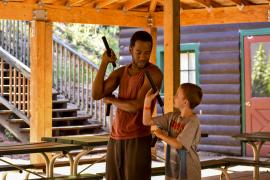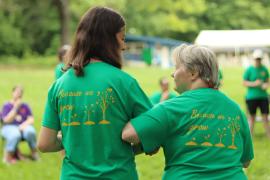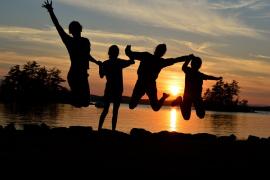You might be thinking . . . “How is it May already?”
You are not alone in that thought. Summer is looming large for everyone, and if you are reading this, you are probably working at camp this summer. Congrats!
It’s time to start gearing up for camp! Did you . . .
- finalize your paperwork?
- start planning what to bring to camp?
- take a look at what training will be like?
- find out when and where you should be at camp?
- share your camp’s phone policy with family and friends?
- complete pre-camp training (if offered)?
- research camp games, songs, transitions, behavior management techniques, conflict resolution tricks, how to create a sense of belonging, communication styles, support strategies, campfire skits?
OK, that last one was a little much — but did your brain start to swirl a little? Did you have a flutter of excitement mixed with other emotions? Are you starting to wonder “How am I going to make it through this summer? This is starting to stress me out! AHHHH!!! What do I do now?”
Take a deep breath. Keep reading.
Stress management and burnout have been consistent topics from your supervisors for the last several years. They want to know what they can do to help their staff (that’s you!) manage stress experienced at camp and how to prevent crashing and burning. So, I have been on a journey to help others think about how stress shows up for ourselves and what we can do ahead of camp to combat those concerns.
If you haven’t checked out the book Burnout: The Secret to Unlocking the Stress Cycle by Emily and Amelia Nagoski, it is definitely worth the read. It got me thinking there are some simple ways for us to handle our stress, but we need to increase the magnification on our summer lenses to really see clearly how this can be done with success. The summer camp season is its own separate year. We can’t do the same things to handle issues, feelings, conflicts, etc. that may arise during the camp season as we do during the rest of the year. So let’s think about a few ways we can help ourselves and our directors out this summer.
Even in the best of summers, there will always be stressors. Some we can avoid or plan how to respond, but there will be times we have no choice but interact with that stressor, which activates a response in our mind and body. What can we do to get ourselves back on track where you feel relief and can give the very best to our campers?
How Do You Reset Yourself When Feeling Stressed?
(and if the answer is nothing, you are on the way to burnout crash town)
You may think the answer seems simple, but it’s important. Laughing, going for a run, dance parties, a giant hug, writing in a journal, just taking a second to breathe are all ways you may hit the reset button. That’s awesome, but now . . .
Can You Realistically Accomplish What You Identified?
Depending on what type of camp you are working at this summer, what the schedule looks like, what the demands of your job are, this may be tougher than you think. If you are a staff member leading wilderness expeditions this summer and your reset action is going for a long run then a hot shower afterwards, you may need to rethink that based on your situation at times. What else can you do in that situation to get the same result? Not sure? Now’s the time to figure it out.
What Does Rest Mean to You?
You may be thinking, “yeah, yeah, sleep is great. I just don’t have time for it in the summer! My campers need me.” Rest is not just for sleeping. It's time to switch your brain to something else. Can you imagine being a camper, getting up early, interacting with new people, trying to figure out where you belong, where you have to go next, if you are going to get to sit by your friends at lunch, why it is so loud in the dining hall, etc. etc. etc.
Yeah, that’s a lot — even for adults.
Rest lets our brain do a reset and regulates our body. Some people need to nap; others read a book, or maybe just stare at water. It’s important to take a moment to rest. It might be planned into the schedule, or you may need to add it. It can be as simple as sitting down with your campers and enjoying building Lego structures with them. And sometimes, this is the best part of camp — the small, quiet moments that can make an impact and build relationships.
To Sleep or Not to Sleep? That Is the Question!
No. That is not a question you should be asking yourself. Always sleep. Whatever you are putting sleep off for will still be there tomorrow. Paperwork, social media, laundry — it all will still be there. Go to sleep.
Think about this: There are several studies that show that lack of sleep contributes to poor mental health, rise in anxiety, messes with our emotions in a negative way, and can decrease our daily functioning (Palmer et al., 2023). Being sleep deprived has also been compared to being impaired by alcohol (Williamson and Feyer, 2000).
That is a scary thought — especially since we are taking care of campers, ensuring our safety and theirs, and making decisions that may have consequences if not thought about rationally.
Get some sleep this summer.
Make and Keep Connections
We come into camp with friends and family who we like to connect with while working at camp. Sometimes it is harder during the summer because of our responsibilities. To some, this is a really hard transition to make. Plan how you are going to keep those connections going during the summer while fulfilling your job roles and responsibilities. You may not have access to your phone during the day. What mind shift do you need to make around that possibility? Can you make plans for your time off to maintain those relationships? What else can you do?
One of the best parts of working at camp are the people who work alongside you. They know exactly what you are going through and vice versa. Some of our stress about working at camp is Who do I turn to when I have a question or need some advice? You may be able to find that person right away. And it is totally acceptable to ask your director or another trusted staff member for help. Asking questions, getting guidance, and contributing to creating a positive camp environment for our campers is our goal. Building your connections within camp while maintaining outside relationships will provide you with the support you need to balance your summer.
Last, But Not Least . . . Planning
When it comes to camp, flexibility is key. Even our best planned days sometimes go right out the back of the tent. That can be stressful. Thinking about how we deal with that stressor in our planning is key. Sometimes it’s enough to keep in mind that this is camp and plans will change. For others, having a detailed daily plan with the calendar all set up is really helpful. If you struggle with taking time to sleep, rest, or eat amongst everything else in your day, plan what 24 hours looks like for you.
In Burnout, the authors offer a great way to think about how to structure your day and encourage looking at what 24/7 looks like. You may be thinking, “that seems like too much.” For some, it has been really helpful to visually see how their summer — daily, weekly, and monthly — will look like. In the day camp setting, for example, you may already know that you are heading to a concert late one night after camp is over for the day. You can plan now to see if you can change shifts that next day so you get enough sleep so you are ready to give it your all for your campers. Your director will definitely appreciate you planning ahead!
Getting ready for camp is more than physically packing your bags. We have to mentally and emotionally prepare as well. Our campers and families are going through the same thing as they prepare for the summer. We have them answer questions about how best to prepare for their camper so we are ready to make this a great summer for them. We need to do the same for ourselves.
- What will make this the best summer for me?
- What can I plan ahead when thinking about stress and how to keep myself in a good place to be able to be the best staff person for our campers?
- Who can I connect with for help?
May you have a wonderful summer! Enjoy all the ups and downs, the laughs, the tears, and the incredible work you are doing. Thank you for all that you will do for our campers and their families.
Photo courtesy of Camp Rock in Bloomington, Indiana
This blog was written on behalf of ACA's Project Real Job, whose goal is to support camps in their efforts to recruit, hire, and retain staff.
Kelly Coulthard has worked within the afterschool and camp profession for over 25 years. Kelly provides keynotes, consultation, and training for youth development organizations through her business, Spark 2 Ember Consulting. She can be contacted at [email protected].
References
Nagoski, E., & Nagoski, A. (2020). Burnout: The secret to unlocking the stress cycle. Ballantine Books.
Palmer, C. A., Bower, J. L., Cho, K. W., Clementi, M. A., Lau, S., Oosterhoff, B., & Alfano, C. A. (2024). Sleep loss and emotion: A systematic review and meta-analysis of over 50 years of experimental research. Psychological Bulletin, 150(4), 440–463. doi.org/10.1037/bul0000410
Williamson, A. M., & Feyer, A.-M. (2000). Moderate sleep deprivation produces impairments in cognitive and motor performance equivalent to legally prescribed levels of alcohol intoxication. Occupational and Environmental Medicine, 57(10), 649–655. doi.org/10.1136/oem.57.10.649.
The views and opinions expressed by contributors are their own and do not necessarily reflect the views of the American Camp Association or ACA employees.




